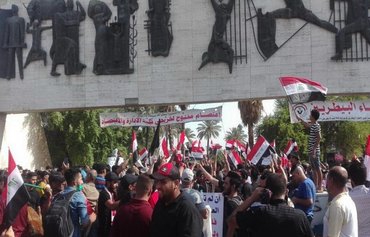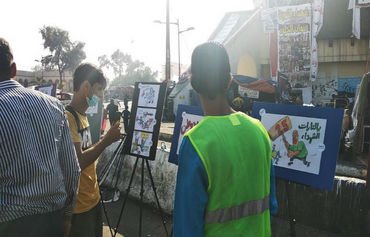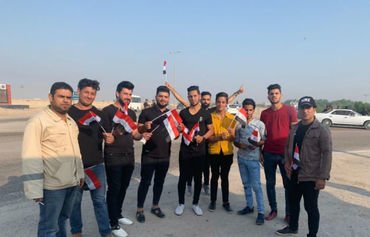Anger at the Iranian regime and its agents has been a common theme of ongoing protests on the Iraqi and Iranian streets, political researchers said.
Iran's Islamic Revolutionary Guard Corps (IRGC) has had a direct hand in creating the security and economic conditions that are driving the angry protests in both countries, they told Diyaruna.
In Iraq, protestors have been taking to the streets to denounce the negative role that Iran-backed Iraqi militias are playing in their country.
Iraqi protestors and their denunciation of the Iranian regime have meanwhile motivated the Iranian people to take to the streets themselves and express their rejection of their government, journalist Ziyad al-Sinjari told Diyaruna.
Iranian sentiments had been simmering for some time, he said, and there had been sporadic protests, up until the government's mid-November decision to raise gas prices.
This move resulted in a volcanic eruption against the government, he said, which has been much larger in scope than the decision to increase gas prices.
Expression of public anger
Al-Sinjari noted that protests in both Iraq and Iran are an expression of public anger towards the Iranian regime, whose policies have provoked ire in both countries.
In both cases, he said, the wealth of these nations has been depleted in order to impose the will of the Iranian regime and its agents on the people.
In Iran, the regime is using national resources to strengthen the IRGC, he said, pointing out that IRGC-affiliated militias are now doing the same in Iraq.
Both nations are suffering under the weight of the same economic burdens, he said, which include widespread corruption, unemployment and poor public services.
At the same time as the Iranian regime is suppressing the freedoms of its people, Iran-aligned Iraqi militias are undermining the rule of law in Iraq, stirring unrest and terrorising Iraqis with their violence, he added.
Their objective is to dominate and control the affairs of Iraq and bend it to the Iranian will, al-Sinjari said.
The protests have crossed all red lines put in place by the Iranian regime and its agents, he said, with protestors now telling the regime and its militias without fear that they demand an end to the killing and pillaging of their wealth.
Iraqi protestors in Baghdad and the south have set fire to pictures of Iran's supreme leader Ali Khamenei and IRGC Quds Force commander Qassem Soleimani, he said.
Meanwhile, video footage circulated online shows Iranian protestors in the southern part of Tehran burning pictures of Khamenei.
Violent suppression of protests
In Iraq, Iran-backed militias have cracked down on unarmed Iraqi protestors, political analyst Ghanim al-Abid told Diyaruna.
Protestors have been targeted by snipers, abducted or killed, and media personnel covering the protests have been accosted, he said.
In Iran, the regime has been relying on the Basij paramilitary force and other forces associated with the IRGC to forcefully suppress demonstrations.
Protestors are being pursued and arrested, and in some cases, killed, while the blocking of the internet has further restricted people's freedoms, he added.
Al-Abid said he believes the nature of the protests themselves is what is driving the violent reactions by the Iranian regime and its agents towards protests in Iraq and Iran.
They are spontaneous and non-partisan in nature, and raise clear slogans denouncing the malign activities of the IRGC and groups loyal to it, he said.
The protests are also of a patriotic nature and express common aspirations, he said, noting that Iraqis want to secure their future without Iran-backed militias, while Iranians want to break free from the regime's iron grip.
Iraqis bear no enmity towards the Iranian people, al-Abid stressed.
Their animosity is rather directed towards the Iranian regime, he said, which they see as violating their country's sovereignty and harming rather than respecting them, as neighbours.
As a people, he said, Iranians are also victims of the regime's policies.

![Iraqi protestors in Baghdad's Tahrir Square raise their country's national flag on November 9th. [Diyaruna]](/cnmi_di/images/2019/12/05/21197-Iraq-Tahrir-square-600_384.jpg)






